library_name: transformers
language:
- vi
- en
- zh
base_model:
- Qwen/Qwen2.5-3B-Instruct
pipeline_tag: visual-question-answering
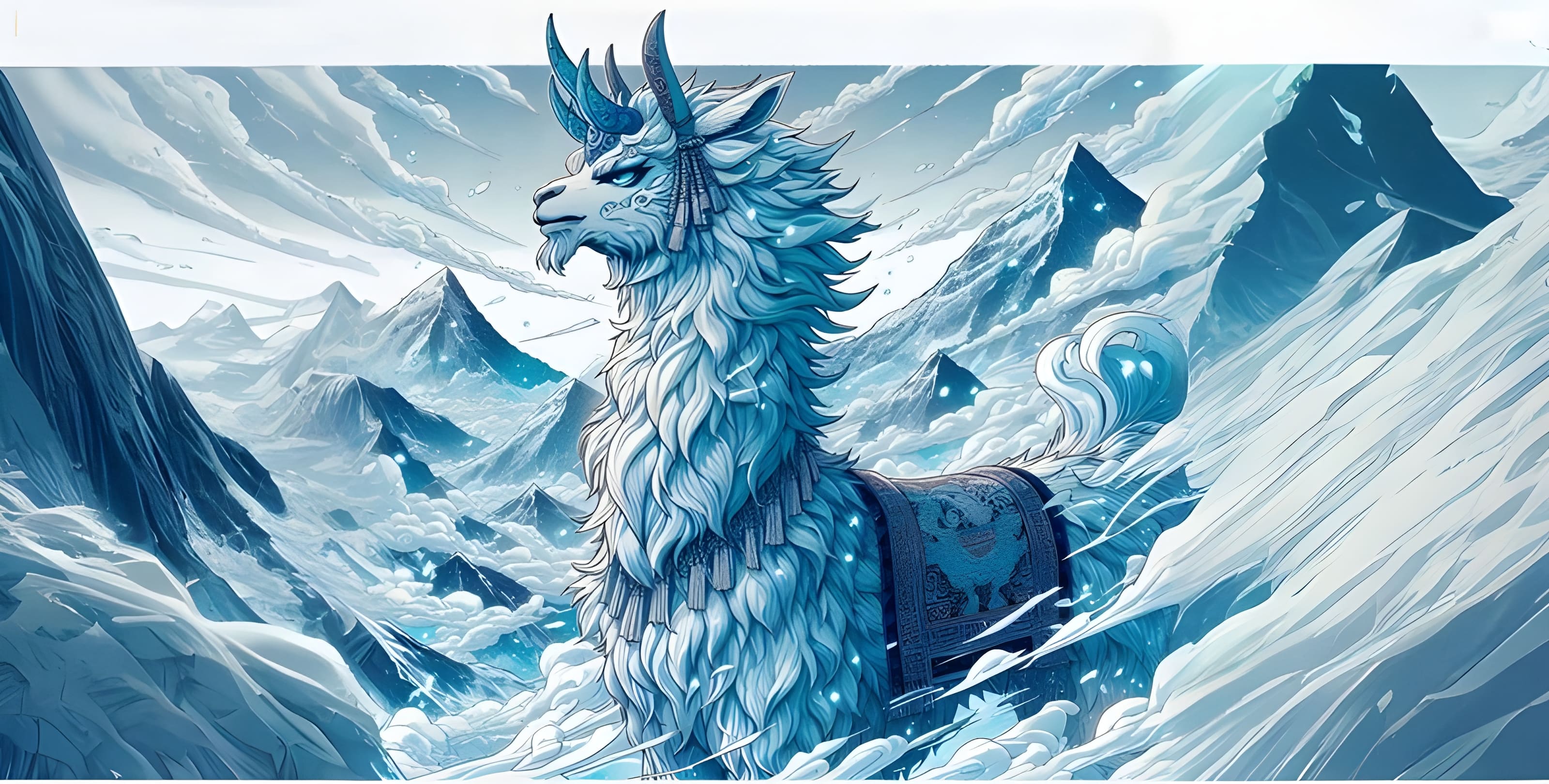
Vintern-3B-beta 🇻🇳 ❄️ - The LLaVA 🌋 Challenger
What's new in Vintern-3B-beta!
- We successfully reproduced the training process of InternVL from scratch.
- The model is the result of integrating Qwen/Qwen2.5-3B-Instruct and InternViT-300M-448px through an MLP layer.
- Trained with more than 10 Milion Vietnamese QnAs, Descriptions, and 10% English, Chinese Data from OpenGVLab/InternVL-Chat-V1-2-SFT-Data.
Model Details
| Model Name | Vision Part | Language Part |
|---|---|---|
| Vintern-3B-beta | InternViT-300M-448px | Qwen2.5-3B-Instruct |
Bytedance/MTVQA Benchmark
We surpassed GPT-4o and are approaching Gemini 1.5 Pro on the MTVQA dataset for Vietnamese. The benchmark result in MTVQA from open_vlm_leaderboard.
| Rank | Method | Param (B) | Language Model | Vision Model | VI |
|---|---|---|---|---|---|
| 1 | Gemini-1.5-Pro | 41.3 | |||
| 2 | Vintern-3B-beta | 3 | Qwen2.5-3B-Instruct | InternViT-300M | 41.289 |
| 3 | GPT-4o (0513, detail-h...) | 39.6 | |||
| 4 | GPT-4o (0806, detail-h...) | 38.9 | |||
| 5 | Gemini-1.5-Flash | 38.9 | |||
| 6 | Qwen-VL-Max-0809 | 72 | Qwen2-72B | ViT-600M | 36.9 |
| 7 | GPT-4o (0513, detail-lo...) | 26.1 | |||
| 8 | Qwen-VL-Plus-0809 | 27.8 | |||
| 9 | GLM-4v-9B | 9 | GLM-4-9B | EVA-02-5B | 26.6 |
| 10 | InternVL2-Llama3-76B | 76 | Llama-3-70B-Instruct | InternViT-6B | 26.7 |
| 11 | Step-1.5V | Step-1.5 | stepencoder | 18.4 | |
| 12 | InternVL2-40B | 40 | Nous-Hermes-2-Yi-34B | InternViT-6B | 21.2 |
| 13 | Pixtral-12B | 13 | Nemo-12B | ViT-400M | 19.7 |
Zalo VMLU Benchmark
The Vintern-3B-beta achieved a score of 54.81 on the Zalo VMLU Benchmark.
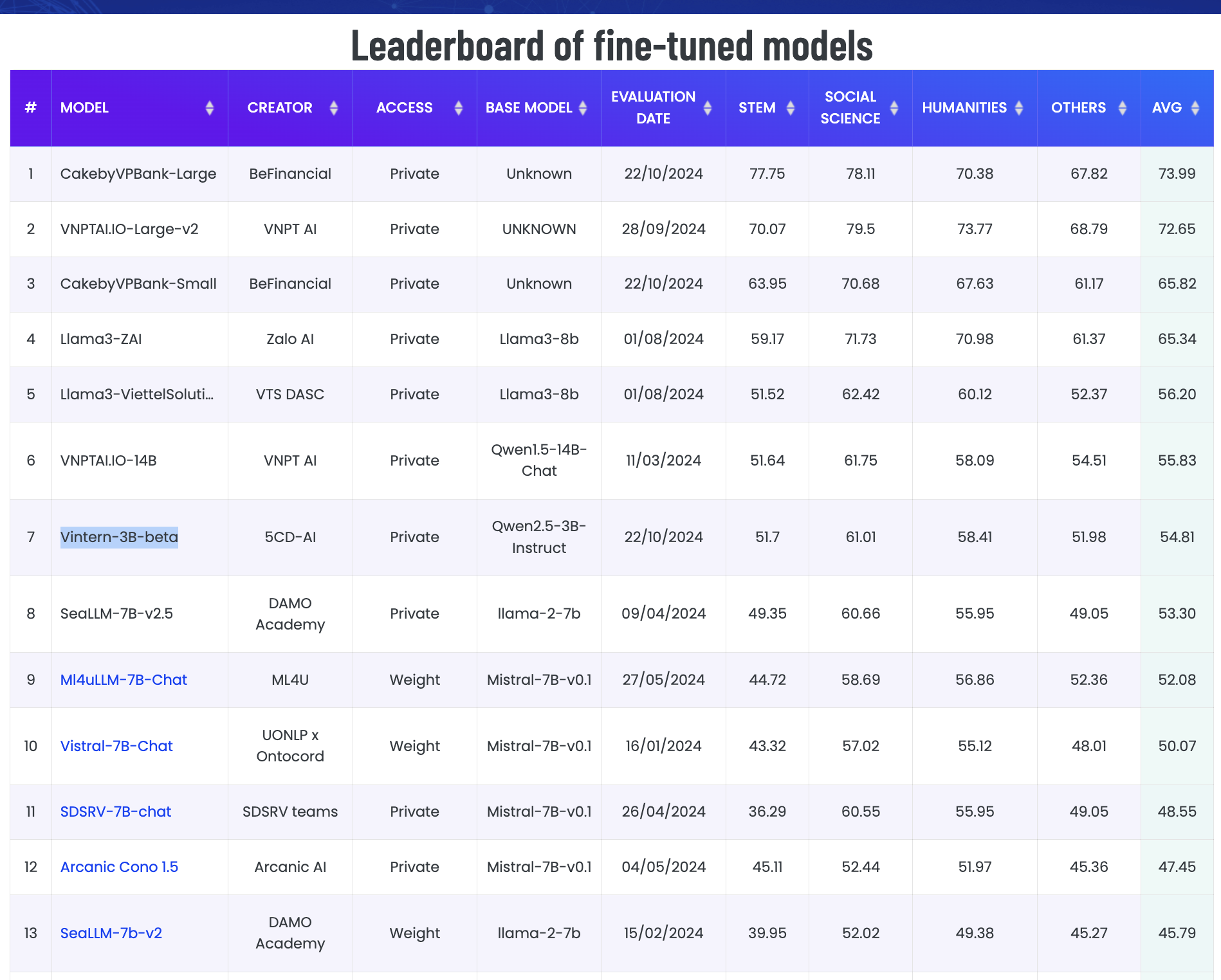
generation_config = dict(max_new_tokens= 64, do_sample=False, num_beams = 1, repetition_penalty=1.5)
question = "Bạn là trợ lý AI giải trắc nghiệm rất chính xác. Bạn biết chắc chắn đáp án đúng nhất. Chỉ đưa ra chữ cái đứng trước câu trả lời đúng của câu hỏi trắc nghiệm sau: Các cơ quan nào sau đây là cơ quan tư pháp? Lựa Chọn:\nA. Viện kiểm sát nhân dân\nB. Tòa án nhân dân\nC. Chính phủ\nD. Cả A và B\nCâu trả lời đúng nhất là:"
model.chat(tokenizer, None, question, generation_config)
OpenCompass Benchmark
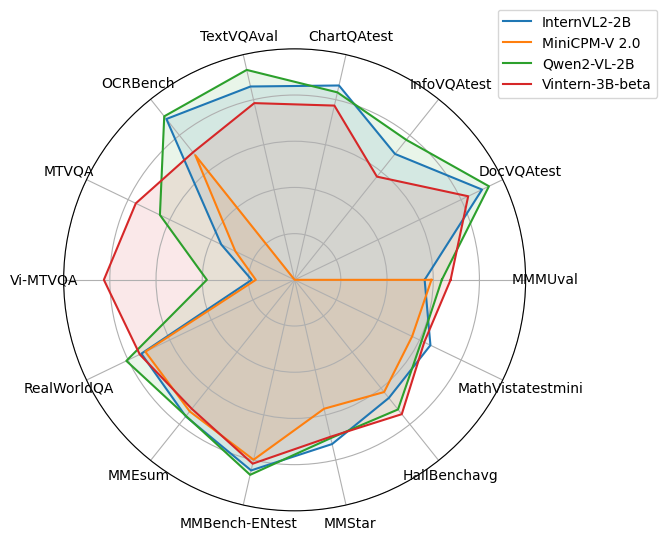
Vintern-3B-beta is now on open_vlm_leaderboard. You can visit to view more detailed evaluations.
The current results are at a quite good level, and we are expanding the training set in English and other languages to approach models within a comparable parameter range.
"The table is referenced from the repo Qwen/Qwen2-VL-2B-Instruct."
| Benchmark | InternVL2-2B | MiniCPM-V 2.0 | Qwen2-VL-2B | Vintern-3B-beta |
|---|---|---|---|---|
| MMMUval | 36.3 | 38.2 | 41.1 | 43.55 |
| DocVQAtest | 86.9 | - | 90.1 | 80.47 |
| InfoVQAtest | 58.9 | - | 65.5 | 48.28 |
| ChartQAtest | 76.2 | - | 73.5 | 68.32 |
| TextVQAval | 73.4 | - | 79.7 | 67.09 |
| OCRBench | 781 | 605 | 794 | 619 |
| MTVQA | 10.9 | 8.8 | 20.0 | 23.58 |
| Vi-MTVQA | 9.3 | 8.4 | - | 41.29 |
| RealWorldQA | 57.3 | 55.8 | 62.9 | 57.9 |
| MMEsum | 1876.8 | 1808.6 | 1872.0 | 1772.9 |
| MMBench-ENtest | 73.2 | 69.1 | 74.9 | 70.62 |
| MMStar | 49.8 | 39.1 | 48.0 | 47.6 |
| HallBenchavg | 38.0 | 36.1 | 41.7 | 43.22 |
| MathVistatestmini | 46.0 | 39.8 | 43.0 | 43.9 |
(SEED-Bench-2-Plus)[https://openaccess.thecvf.com/content/CVPR2024/papers/Li_SEED-Bench_Benchmarking_Multimodal_Large_Language_Models_CVPR_2024_paper.pdf]: CVPR2024
We achieved Rank 1 for models under 4 billion parameters on the SEED-Bench benchmark, recently published by Tencent at CVPR2024.
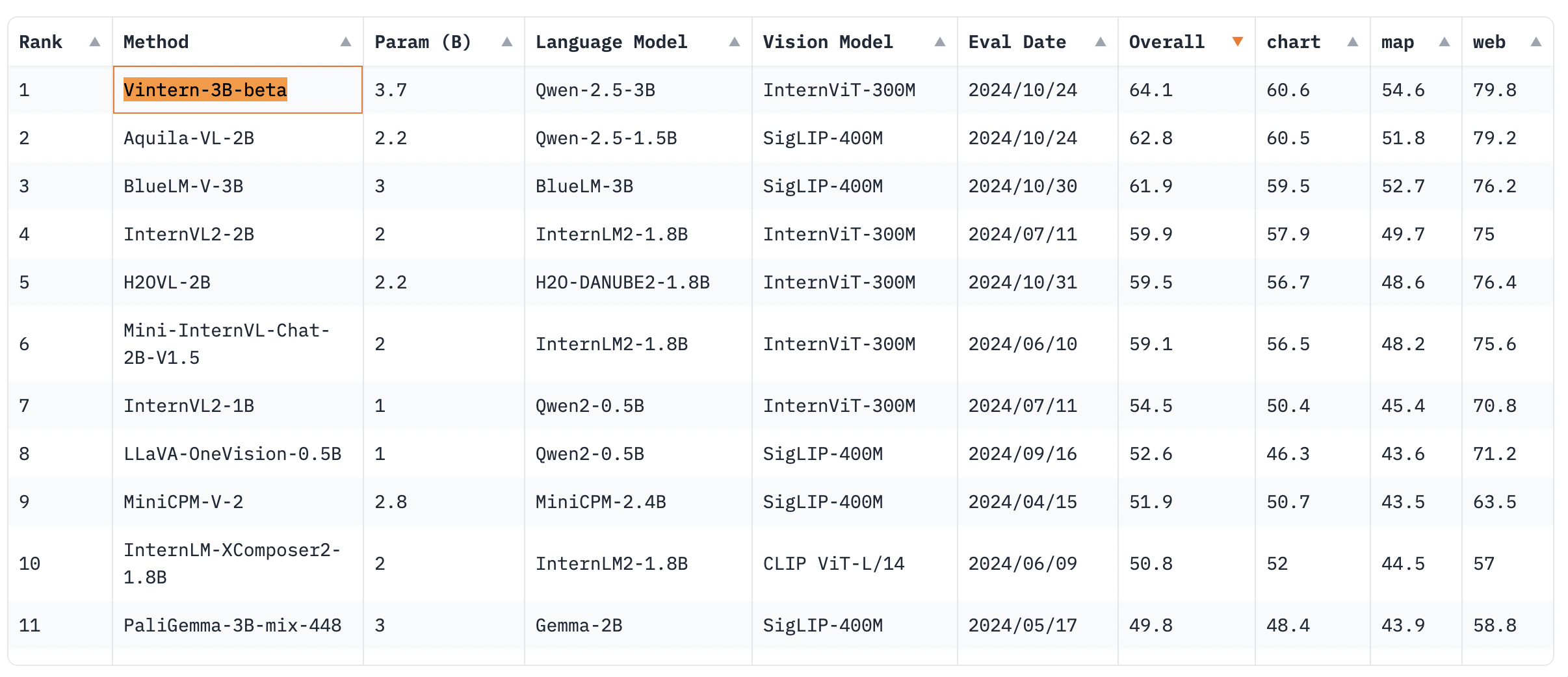
Examples
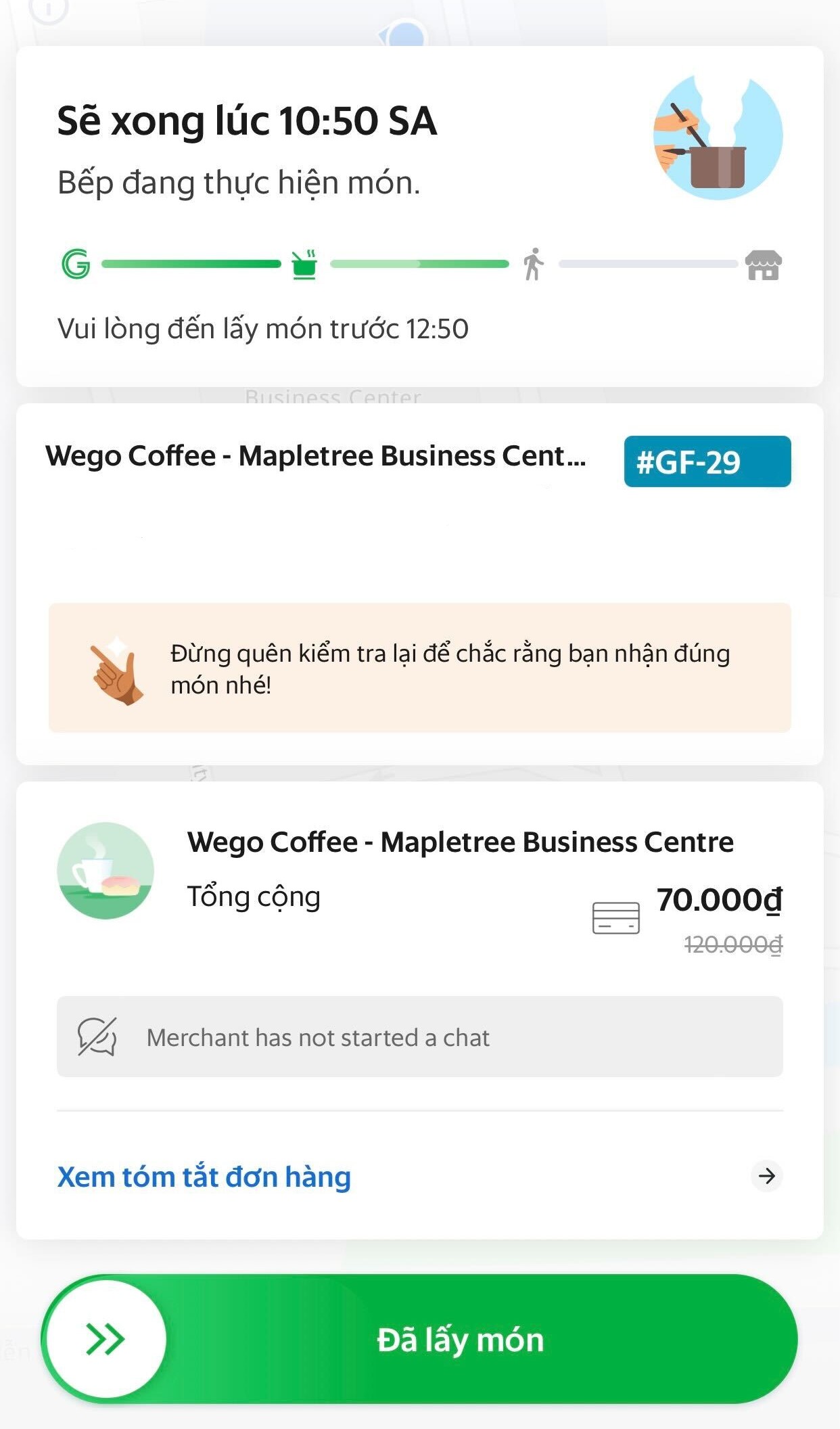
User: <image>
Mô tả hình ảnh chi tiết.
Assistant: Bức ảnh là một giao diện ứng dụng đặt hàng thức ăn trực tuyến. Giao diện được chia thành các phần:
- Phần đầu tiên hiển thị thông báo "Sẽ xong lúc 10:50 SA" và dòng chữ "Bếp đang thực hiện món.". Bên cạnh đó là biểu tượng bếp đang hoạt động với thanh tiến độ màu xanh lá cây.
- Tiếp theo là dòng chữ "Vui lòng đến lấy món trước 12:50".
- Phần tiếp theo là thông tin về quán cà phê "Wego Coffee - Mapletree Business Centre", kèm theo dòng chữ "#GF-29".
- Dòng chữ "Đừng quên kiểm tra lại để chắc rằng bạn nhận đúng món nhé!" được hiển thị trong một khung hình chữ nhật màu be.
- Phần cuối cùng là thông tin về đơn hàng, bao gồm logo quán cà phê, dòng chữ "Wego Coffee - Mapletree Business Centre", dòng chữ "Tổng cộng", giá trị đơn hàng (70.000đ), giá trị thanh toán (120.000đ) và dòng chữ "Merchants has not started a chat".
- Cuối cùng là nút "Xem tóm tắt đơn hàng" và nút "Đã lấy món" có màu xanh lá cây.

User: <image>
Liệt kê toàn bộ bài thơ có trong ảnh.
Assistant: Đi khắp thế gian không ai tốt bằng mẹ Gánh nặng cuộc đời không ai khổ bằng cha
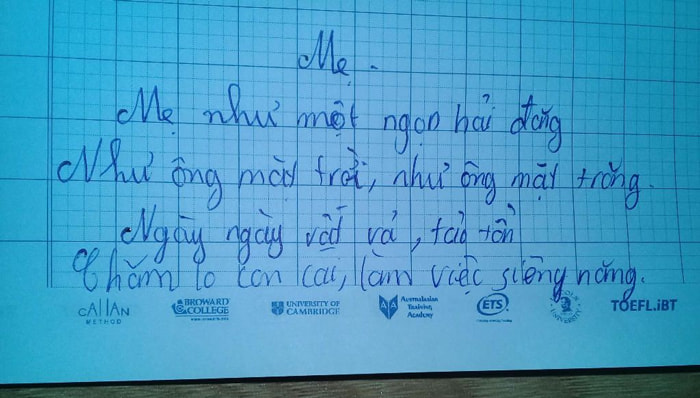
User: <image>
Liệt kê toàn bộ bài thơ có trong ảnh.
Assistant: Bài thơ có nội dung:
- Mẹ như một ngọn hải đăng
- Như ông mặt trời, như ông mặt trăng
- Ngày ngày vất vả, tảo tần
- Chăm lo con cái, làm việc siêng năng.

User: <image>
Mô tả hình ảnh chi tiết.
Assistant: Bức ảnh chụp một bảng đen với các công thức toán học được viết bằng phấn trắng. Ở góc trên bên trái, có dòng chữ "20/19/SGK" được viết bằng màu vàng nhạt. Tiếp theo là phần a) với hai phương trình:
3x + y = 3
2x - y = 7
Dưới hai phương trình này là mũi tên chỉ sang phải và hai phương trình mới:
5x = 10
3x + y = 3
3.2 + y = 3
Sau đó là dòng chữ "x = 2"
y = -3
Cuối cùng là dòng chữ "Vậy hpt đã cho có no! (x; y) = (2; -3)"

User: <image>
Mô tả hình ảnh chi tiết.
Assistant: Bức ảnh minh họa quá trình xử lý hình ảnh bằng mạng lưới thần kinh nhân tạo (CNN). Bức ảnh được chia thành 3 phần chính:
1. **Phần đầu tiên:** Hiển thị một hình ảnh của một chiếc xe hơi màu trắng với dòng chữ "input image" ở bên dưới.
2. **Phần thứ hai:** Hiển thị 6 khối vuông, mỗi khối đại diện cho một lớp trong mạng CNN. Các lớp được đánh số thứ tự từ trái sang phải:
* Convolutional layer
* Pooling layer
* Convolutional layer
* Pooling layer
* Fully-connected layer
* Predicted class
3. **Phần thứ ba:** Hiển thị một hình ảnh với dòng chữ "car" ở bên dưới.
Một mũi tên màu đen nối các khối vuông với nhau, thể hiện quá trình truyền dữ liệu giữa các lớp.
Quickstart
Here provides a code snippet to show you how to load the tokenizer and model and how to generate contents. To run inference using the model, follow the steps outlined in our Colab inference notebook
import numpy as np
import torch
import torchvision.transforms as T
# from decord import VideoReader, cpu
from PIL import Image
from torchvision.transforms.functional import InterpolationMode
from transformers import AutoModel, AutoTokenizer
IMAGENET_MEAN = (0.485, 0.456, 0.406)
IMAGENET_STD = (0.229, 0.224, 0.225)
def build_transform(input_size):
MEAN, STD = IMAGENET_MEAN, IMAGENET_STD
transform = T.Compose([
T.Lambda(lambda img: img.convert('RGB') if img.mode != 'RGB' else img),
T.Resize((input_size, input_size), interpolation=InterpolationMode.BICUBIC),
T.ToTensor(),
T.Normalize(mean=MEAN, std=STD)
])
return transform
def find_closest_aspect_ratio(aspect_ratio, target_ratios, width, height, image_size):
best_ratio_diff = float('inf')
best_ratio = (1, 1)
area = width * height
for ratio in target_ratios:
target_aspect_ratio = ratio[0] / ratio[1]
ratio_diff = abs(aspect_ratio - target_aspect_ratio)
if ratio_diff < best_ratio_diff:
best_ratio_diff = ratio_diff
best_ratio = ratio
elif ratio_diff == best_ratio_diff:
if area > 0.5 * image_size * image_size * ratio[0] * ratio[1]:
best_ratio = ratio
return best_ratio
def dynamic_preprocess(image, min_num=1, max_num=12, image_size=448, use_thumbnail=False):
orig_width, orig_height = image.size
aspect_ratio = orig_width / orig_height
# calculate the existing image aspect ratio
target_ratios = set(
(i, j) for n in range(min_num, max_num + 1) for i in range(1, n + 1) for j in range(1, n + 1) if
i * j <= max_num and i * j >= min_num)
target_ratios = sorted(target_ratios, key=lambda x: x[0] * x[1])
# find the closest aspect ratio to the target
target_aspect_ratio = find_closest_aspect_ratio(
aspect_ratio, target_ratios, orig_width, orig_height, image_size)
# calculate the target width and height
target_width = image_size * target_aspect_ratio[0]
target_height = image_size * target_aspect_ratio[1]
blocks = target_aspect_ratio[0] * target_aspect_ratio[1]
# resize the image
resized_img = image.resize((target_width, target_height))
processed_images = []
for i in range(blocks):
box = (
(i % (target_width // image_size)) * image_size,
(i // (target_width // image_size)) * image_size,
((i % (target_width // image_size)) + 1) * image_size,
((i // (target_width // image_size)) + 1) * image_size
)
# split the image
split_img = resized_img.crop(box)
processed_images.append(split_img)
assert len(processed_images) == blocks
if use_thumbnail and len(processed_images) != 1:
thumbnail_img = image.resize((image_size, image_size))
processed_images.append(thumbnail_img)
return processed_images
def load_image(image_file, input_size=448, max_num=12):
image = Image.open(image_file).convert('RGB')
transform = build_transform(input_size=input_size)
images = dynamic_preprocess(image, image_size=input_size, use_thumbnail=True, max_num=max_num)
pixel_values = [transform(image) for image in images]
pixel_values = torch.stack(pixel_values)
return pixel_values
model = AutoModel.from_pretrained(
"5CD-AI/Vintern-3B-beta",
torch_dtype=torch.bfloat16,
low_cpu_mem_usage=True,
trust_remote_code=True,
).eval().cuda()
tokenizer = AutoTokenizer.from_pretrained("5CD-AI/Vintern-3B-beta", trust_remote_code=True, use_fast=False)
test_image = 'test-image.jpg'
pixel_values = load_image(test_image, max_num=6).to(torch.bfloat16).cuda()
generation_config = dict(max_new_tokens= 512, do_sample=False, num_beams = 3, repetition_penalty=3.5)
question = '<image>\nMô tả hình ảnh một cách chi tiết.'
response, history = model.chat(tokenizer, pixel_values, question, generation_config, history=None, return_history=True)
print(f'User: {question}\nAssistant: {response}')
#question = "Câu hỏi khác ......"
#response, history = model.chat(tokenizer, pixel_values, question, generation_config, history=history, return_history=True)
#print(f'User: {question}\nAssistant: {response}')
Bias, Risks, and Limitations
The model might have biases because it learned from data that could be biased. Users should be cautious of these possible biases when using the model.
Citation
@misc{doan2024vintern1befficientmultimodallarge,
title={Vintern-1B: An Efficient Multimodal Large Language Model for Vietnamese},
author={Khang T. Doan and Bao G. Huynh and Dung T. Hoang and Thuc D. Pham and Nhat H. Pham and Quan T. M. Nguyen and Bang Q. Vo and Suong N. Hoang},
year={2024},
eprint={2408.12480},
archivePrefix={arXiv},
primaryClass={cs.LG},
url={https://arxiv.org/abs/2408.12480},
}